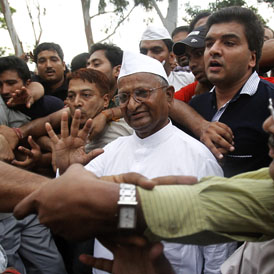Anti-corruption campaigner Anna Hazare arrested
India’s leading anti-corruption campaigner has been arrested just hours before he was due to begin a fast to the death.
At least 1,200 followers of the 74-year-old were also detained, signalling a hardline stance from Prime Minister Manmohan Singh against anti-government protests, a gamble that risks a wider backlash against the ruling Congress party.
Dressed in his trademark white shirt, white cap and spectacles in the style of independence leader Mahatma Gandhi, Hazare was driven away in a car by plain clothes police, waving to hundreds of supporters outside his residence in New Delhi.
His followers later said Hazare, a former army soldier, had begun his fast in detention: “The second freedom struggle has started … This is a fight for change,” Hazare said in a pre-recorded message broadcast on YouTube.
“The protests should not stop. The time has come for no jail in the country to have a free space.”

Middle class ‘fed up’ of bribes
In a country where the memory of Gandhi’s independence battles against colonial rule with fasts and non-violent protests is embedded in the national consciousness, the crackdown shocked many Indians.
It also comes as Congress Party leader Sonia Gandhi is in the United States being treated for an undisclosed condition. The question for many is whether Hazare and his movement will grow across the fast-urbanising nation of 1.2bn people whose increasingly assertive middle class is fed up with constant bribes, poor services and unaccountable leaders.
In a worrying sign for a government facing crucial state elections next year, local media reported spontaneous protests against the crackdown from India’s financial centre Mumbai and IT hub Bangalore to the state of Bihar. Police said several hundred people were arrested, mainly in Delhi.
An anti-graft protester was found dead in a blood-soaked car in Bhopal, where hundreds had taken to the streets in solidarity with Hazare. A senior police officer told Reuters it was not clear whether the death was linked to the protests.
“If the government stops protests or not, what it can’t stop is the anger, which ultimately means bad news for Congress when people go to the polls,” said M.J. Akbar, an editor at news magazine India Today.
“People expect Singh to be strong on corruption, not to be strong on those who protest against corruption.”
The country’s home minister said Hazare and six other protest leaders had been placed under “preventative arrest” to ensure they did not carry out a threat to protest.
“Protest is welcome, but it must be carried out under reasonable conditions,” Home Minister Palaniappan Chidambaram told a news conference
Groundswell of discontent
Opposition parties demanded Hazare’s immediate release. Hazare has become a serious challenge to the authority of the government in its second term as it reels from a string of corruption scandals and a perception that it is out of touch with millions of Indians hit by near-double-digit inflation.
The scandals, including a telecoms bribery scam that may have cost the government $39bn, have smothered Singh’s reform agenda, dented investor confidence and distracted parliament just as the $1.6tr economy is being hit by inflation and higher interest rates.
Those arrested included Kiran Bedi, one of India’s first female police officers and a widely respected figure for her anti-graft drive. She tweeted from detention that she had refused an offer of bail.
Tapping into a groundswell of discontent over corruption scandals in Singh’s government, Hazare lobbied for a parliamentary bill creating a special ombudsman to bring crooked politicians, bureaucrats and judges to book.
Hazare called off that fast after the government promised to introduce the bill into parliament. The legislation was presented in early August, but activists slammed the draft version as toothless, prompting Hazare to renew his campaign.
Under the current bill, the prime minister and judges would be exempt from probes.